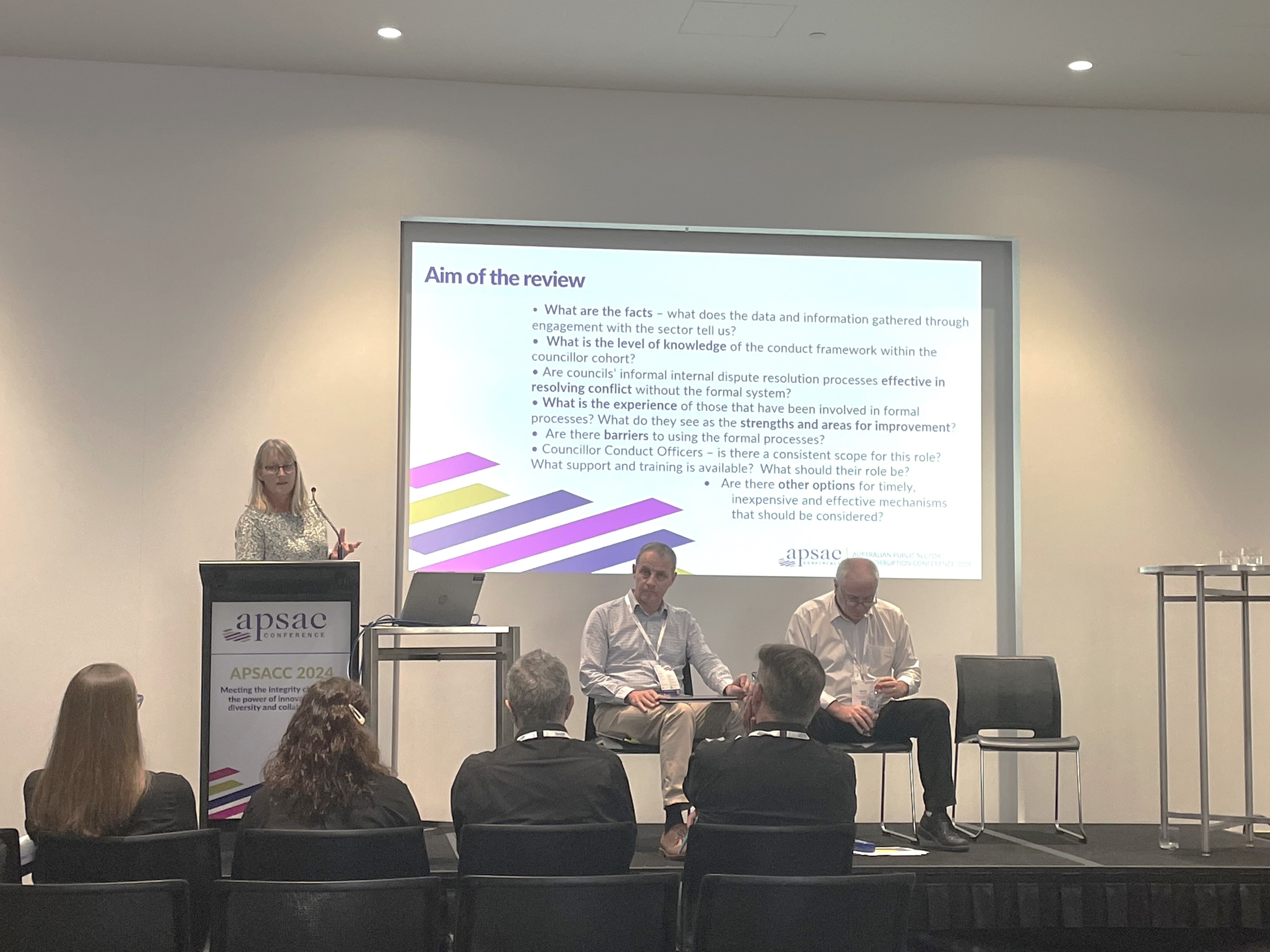- Date:
- 1 Aug 2024
Chief Municipal Inspector's introduction
Proactive sector engagement remains an ongoing priority for my office, particularly in the lead up to the local council elections in October this year.
In recent months, this engagement has taken the form of council visits, presentations at local government events, joint presentations with the IBAC and meetings with our Councillor Conduct Framework Review External Stakeholder Working Group.
In the past five months, the LGI has visited eight local councils to enable better understanding of good governance including conflict of interest management, currency of council policy frameworks, election preparation and procurement.
My office is undertaking significant preparations ahead of the local council election period, which is almost upon us.
It seems timely to remind our stakeholders of the LGI’s role in elections:
As the dedicated integrity agency for councils, we oversight councils, councillors, candidates and voters pursuant to the electoral provisions of the Local Government Act 2020. We work with other government agencies to help ensure a fair and democratic election process.
Our responsibilities include:
- Monitoring candidate eligibility
- Providing advice to and monitoring the conduct of councils and candidates
- Receiving and assessing allegations
- Conducting investigations into potential offences under the Local Government Act (1989 and 2020 Acts)
With the anticipated increase in volume of complaints in the lead-up to the election period, implementing a new case management system (CMS) for our office has been a priority piece of work. Going forward, this new CMS will be of enormous support to our small team. Naturally, during this period, election related complaints will be the priority for our team – meaning there is an impact on the timing of us handling other non-election related complaints.
A full timeline of key election dates is included in this newsletter.
Michael Stefanovic AM
Chief Municipal Inspector
Local Government Amendment (Governance and Integrity) Bill 2024
The Bill includes reforms to strengthen council leadership, capability and councillor conduct, improve early intervention and effective dispute resolution and strengthen oversight mechanisms.
The Bill:
- Introduces ongoing mandates training for mayors and councillors that expand the existing induction training requirements for councillors
- Enables the suspension or disqualification of individual councillors found to have created a risk to health and safety, or prevented the council from performing its functions
- Enhances the enforcement powers of the Chief Municipal Inspector, including by providing the CMI with the ability to issue infringement notices for certain offences under the Act
- Makes improvements to the councillor conduct framework – this will include creating a power to establish in regulations a model councillor code of conduct and increasing the severity of sanctions available for councillor misconduct; and
- Improves the operation of provisions relating to Ministerial oversight, appointment powers and the councillor conduct framework
New powers for the Chief Municipal Inspector
Specifically, the Bill will provide the CMI with the power to table reports in Parliament and brief Ministers with responsibilities under the Local Government Act 2020. The Bill also provides the CMI with the power to serve infringement notices for specified
electoral and personal interests related offences under the Local Government Act 2020. These offences and their respective penalty amount will be prescribed in regulations.
The types of offences intended to be made infringeable are low-level offences relating to the conduct of council elections and personal interests returns, such as the requirement to submit campaign donation returns.
The proposed infringement regulations will be developed in accordance with the Attorney-General's Guidelines to the Infringements Act 2006.
The Bill is available on the Victorian Legislation website: www.legislation.vic.gov.au/bills/local-government-amendment-governance-and-integrity-bill-2024(opens in a new window)
Reminder: Sitting councillors cannot use council resources for electioneering purposes
Sitting councillors are reminded that section 304 of the Local Government Act 2020 clearly states that a councillor or member of council staff must not use council resources in a way that is intended to, or likely to, affect the result of an election.
Council resources include a council email address, council provided mobile phone number, mobile phone, council logo, images owned by council, council photocopiers / paper and the like.
The Act also prohibits the use of council resources to intentionally or recklessly print, publish, authorise or permit the distribution of any electoral material purporting to be on behalf of council (unless it is about the election process).
The penalty for breaching these provisions is some 60 penalty units, or just under $12,000.
Your council’s Election Period Policy, contained within the Governance Rules, will provide you with more information.
Can you use your ‘Mayor/Councillor’ title?
A sitting councillor is still able to use their ‘councillor’ title until 6am on Election Day (when they are officially out of office) when discharging their current councillor duties.
Although not a breach of the Act, we recommend that sitting councillors do not use their Mayor/Deputy Mayor/Councillor title in electoral material because it could be argued that it provides them with an advantage over non-councillor candidates.
Key dates for local council elections
The 2024 local council elections are approaching fast. It is important for new and returning candidates to make note of the key dates to ensure a smooth process in the lead-up to the election.
Outlined below is the official election timeline:
Wednesday 7 August – Roll closes at 4pm
Monday 9 September – Nominations open at 9am
Tuesday 17 September – Nominations, candidate statements, photographs and questionnaires close at 12 noon
Wednesday 18 September – Ballot draw
(Thursday 19 September – Team name and group registrations close at 12 noon, ballot draw at 3pm – Melbourne City Council only)
(Monday 23 September – Team statements, questionnaires, group voting tickets and indication of preferences close at 12 noon – Melbourne City Council only)
Monday 7 October – Ballot pack mail out begins
Friday 25 October – Voting closes at 6pm
Friday 1 November – All postal votes must be received by 12 noon
Friday 15 November – All election results declared
Mandatory Councillor Awareness Training Update
In January 2024, the Inspectorate made recommendations to Local Government Victoria around reforms to be made to the existing mandatory local government candidate training, to further strengthen candidate understanding of the requirements of being a councillor.
The Inspectorate’s recommendations were made following feedback from key stakeholders across the sector as part of our Councillor Conduct Framework Review.
In response to our feedback, along with that from the broader sector, Local Government Victoria accepted a number of the reforms proposed by LGI in developing a new mandatory candidate training module, released on 15 July 2024.
All candidates, including incumbent councillors, must complete the mandatory online training prior to nominating.
“Candidates who have already completed the training prior to 15 July are not required to complete the new training module, however we strongly encourage them to do so.
"The new training will give them a deeper understanding of the complexities of being a councillor, the integrity obligations they have and the value councillors can add to our community,” noted CMI Michael Stefanovic.
Following a post-election review, the Inspectorate will continue to advocate for further reform should a need be identified.
Accessing the training, or seeking further information, can be done here(opens in a new window).
APSAC Conference - Darwin, 2024
Earlier this week, Mick Stefanovic (CMI), David Walker (Team Manager Investigations) and Dawn Bray (Manager Strategy Governance and Operations) presented a workshop at the Australian Public Sector Anti-Corruption Conference (APSACC) in Darwin.
The workshop provided the opportunity to share the nature of the work being undertaken by the LGI - with particular focus on our ongoing Councillor Conduct Framework Review, with a broad grouping of peer agencies.
"Our presentation was well received, and judging by the questions from the audience, it seems as though managing councillor conduct is a challenge in all Australian states and territories," reflected CMI Michael Stefanovic.
The LGI team also met with staff from the Local Government Unit of the Northern Territory, who are also undertaking a review of their councillor conduct framework.
"We also took the opportunity to hold an inaugural meeting with our local government integrity counterparts in Queensland, the Office of the Independent Assessor (OIA)," noted CMI Michael Stefanovic.
Headed by Bronwyn Blagoev, the OIA deals with all allegations relating to poor councillor conduct, including allegations relating to breaches of legislation.


Councillor Conduct Framework Review Update
Work continues on the Inspectorate’s review of the Councillor Conduct Framework.
The External Stakeholder Working Group has met seven times over the past three months to identify opportunities for improvements to the framework introduced by LG Act 2020.
The focus has been on developing proposed Minor, Moderate and Major change models that builds upon the feedback provided by the sector through our diverse engagement program.
Commenting on the update, CMI Michael Stefanovic said, “A report will be provided to the Attorney-General and Minister for Local Government later this year.
“We thank the members of our Working Group for making time in their busy schedules to assist us with this important work.”
Investigations into misuse of position
In recent years, the LGI has investigated a number of complaints where the councillor group, or an individual councillor, has sought and received legal advice without a resolution of council or through a process that is in line with council’s own legal advice policy.
On each occasion, the legal advice sought was in relation to the employment of council’s Chief Executive Officer.
The following memo is provided to ensure that councillors are aware of their obligations under the Local Government Act.
Click here to view the memo.
Fifteen years of strengthening local government integrity
Sunday 1 September 2024 marks the 15-year anniversary of the LGI’s inception.
The Local Government Inspectorate plays a vital role in the Victorian integrity landscape as the agency with primacy oversight of the local government sector.
The Inspectorate was created to provide local government in Victoria with a dedicated agency to reflect the importance of community confidence in their councils.
Staff at the Inspectorate take immense pride in the work they do to improve the local government sector by undertaking thorough investigations of complaints and providing outcomes which reflect the provisions of the Local Government Act.
Over the past 15 years, the Inspectorate has handled:
- Close to 12,000 complaints and allegations
- 65 prosecutions
- 120 audits and examinations
The Inspectorate has also visited all 79 Victorian councils.
Major achievements to date include:
- Informing policy and legislative reform
- Delivering recommendations to improve council operations and integrity
- Recommending municipal monitors be appointed at councils to assist in improving governance
- Undertaking presentations to councils and peak bodies
- Playing a key role in assessing and investigating breaches of the electoral provisions of the Local Government Act at council elections
The Inspectorate has built networks within the sector and developed strong collaborative relationships with other Victorian integrity agencies such as IBAC, Victorian Ombudsman and the Victorian Auditor-General's Office.
The Inspectorate is looking forward to the future with new councillors commencing following the 2024 local government elections, new provisions in the Local Government Act that will allow it to undertake its role better and, with those changes, provide guidance and assistance to the sector to improve integrity and good governance in the sector.
Commenting on the milestone, David Walker, Team Manager Investigations (and longest-serving staffer at the Inspectorate) said, “The last fifteen years have been an interesting journey into a misunderstood tier of government.
“The work that has been done by the Inspectorate to date is very important and has certainly assisted councils to improve their governance and compliance with the Act.”

